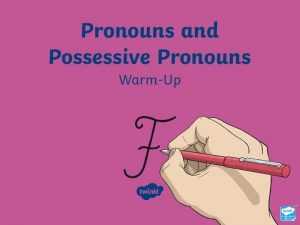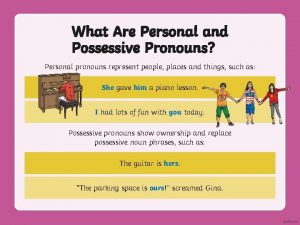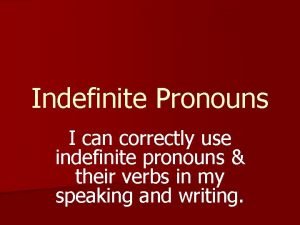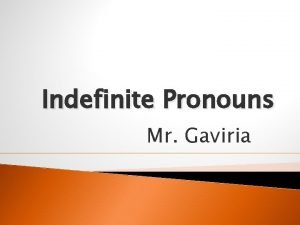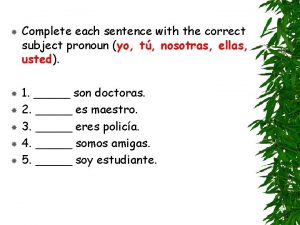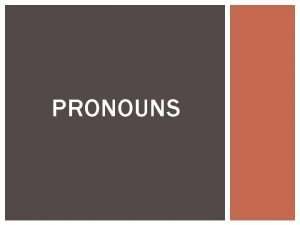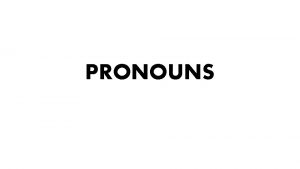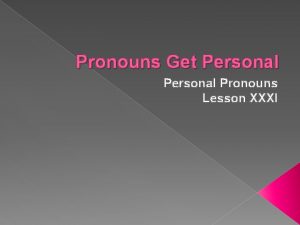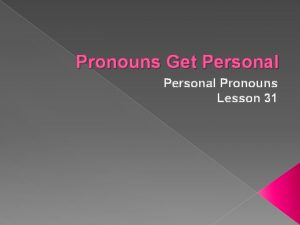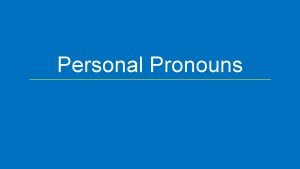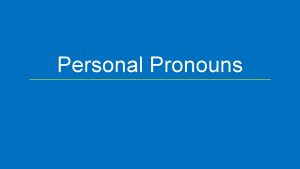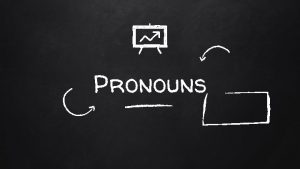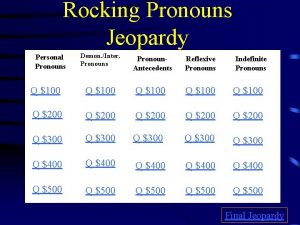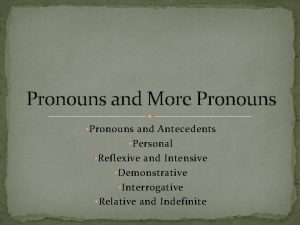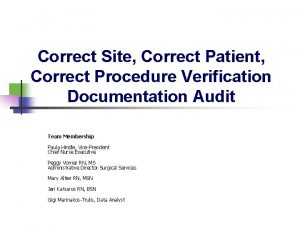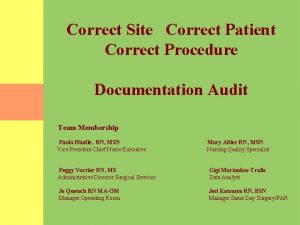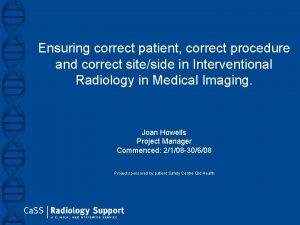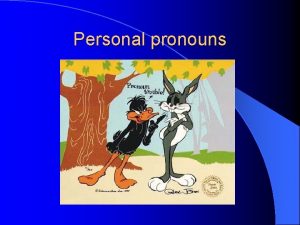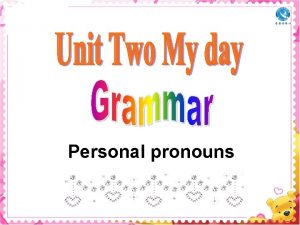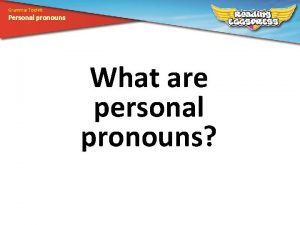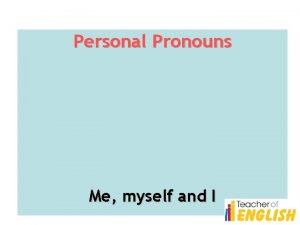THE CORRECT USE OF PRONOUNS PERSONAL PRONOUNS A





























- Slides: 29

THE CORRECT USE OF PRONOUNS


PERSONAL PRONOUNS A pronoun is a word that takes the place of one or more nouns. The word or phrase replaced by a pronoun is called an antecedent. The most frequently used pronouns are called personal pronouns. They refer to

Halloween is one of America's holidays. It is celebrated in October. (Halloween is a noun. It is a pronoun that refers to the antecedent, Halloween. ) When Robert was fixing the car, he cut his hand. (Robert is a noun. He is a pronoun that refers to the antecedent, Robert. )

SUBJECT PRONOUNS A subject pronoun is used as the subject of a sentence. She is my best friend. It is my dog. Does he know the answer? You and I will meet later.

OBJECT PRONOUNS An object pronoun is used as the direct or indirect object or the object of a preposition. Give the book to me. The teacher gave her a reprimand. I will tell you a story. Susan read it to them.

LIST OF PERSONAL PRONOUNS Singular Plural Subject Pronouns Object Pronouns I you he, she, it me you him, her, it we you they us you them

POSSESSIVE PRONOUNS A possessive pronoun is a pronoun that shows who or what has something. A possessive pronoun may take the place of a possessive noun. Your cat is adorable, but not as much as ours.

POSSESSIVE PRONOUNS Subject Pronoun I You He She It We They Possessive Pronoun Mine Yours His Hers Its Ours Theirs Possessive Adjective My Your His Her Its Our Their

DEMONSTRATIVE PRONOUNS Demonstrative pronouns are used for pointing out things. This is my pet rabbit. Look at that! These are sheep but those are goats. Those are horses.

INDEFINITE PRONOUNS An indefinite pronoun is a pronoun that does not refer to a particular person, place, or thing. Does anyone know the story of Midas? Most indefinite pronouns are either singular or plural.

INDEFINITE PRONOUNS All Both Few Nobody Some Another Each Many None Somebody Any Either Most Nothing Someone Anybody Everybody Much One Something Anyone Everyone Neither Others Such Anything Everything No one Several

INDEFINITE PRONOUNS All, any, most, none and some can be singular or plural, depending on the phrase that follows them.

INDEFINITE PRONOUNS When an indefinite pronoun is used as the subject, the verb must agree with it in number. Everyone discusses the plot. (singular) Both talk about King Minos. (plural) All of mythology is about beliefs and ideals. (singular) All of the myths are about beliefs and ideals. (plural)

REFLEXIVE PRONOUNS A reflexive pronoun refers to a noun or another pronoun and indicates that the same person or thing is involved. Reflexive pronouns are formed by adding –self or – selves to certain personal and possessive pronouns. The woman found herself a book of folktales. Reflexive

REFLEXIVE PRONOUNS Singular Plural myself yourself himself, herself, itself ourselves yourselves themselves

INTENSIVE PRONOUNS An intensive pronoun is a pronoun that adds emphasis to a noun or pronoun already named. George himself bought a copy of American Tall Tales. He himself paid for the book.

INTERROGATIVE PRONOUNS Interrogative pronouns are used to ask questions. Often it has no antecedent because the antecedent is unknown. In modern English there are five: what, which, whom, and whose. Whose pen is this? Who is Mom talking to?

RELATIVE PRONOUNS Relative pronouns introduce relative clauses. The most common relative pronouns are who, whom, whose, which, that. The relative pronoun we use depends on what we are referring to and the type of relative clause.

RELATIVE PRONOUNS The driver who ran the stop sign was careless. The children, whom we love dearly, need better educations. Never go to a doctor whose office plants have died. The book, which you gave me, has all the information I need. This is the book that everyone is talking about.

RECIPROCAL PRONOUNS A reciprocal pronoun is a pronoun which is used to indicate that two or more people are carrying out or have carried out an action of some type, with both receiving the benefits or consequences of that action simultaneously. Any time something is done or given in return, reciprocal pronouns are used.

RECIPROCAL PRONOUNS There are only two reciprocal pronouns: each other and one another. Both of them allow you to make sentences simpler. They are especially useful when you need to express the same general idea more than once.

RECIPROCAL PRONOUNS Reciprocal pronouns are easy to use. When you want to refer to two people, you will normally use “each other. ” When referring to more than two people, for example the students in a lecture hall, you will normally use “one another. ”

Terry and Jack were talking to each other in the hallway. We give each other gifts during the holidays. The students congratulated one another after giving practice speeches. The defendants blamed one another for the crime they were charged with.

PRONOUN RULES There a few important rules for using pronouns. Subject pronouns may be used to begin sentences. For example: We did a great job.

PRONOUN RULES Subject pronouns may also be used to rename the subject. For example: It was she who decided we should go to Hawaii.

PRONOUN RULES Indefinite pronouns don’t have antecedents. They are capable of standing on their own. For example: No one likes the sound of fingernails on a chalkboard.

PRONOUN RULES Object pronouns are used as direct objects, indirect objects, and objects of prepositions. For example: David talked to her about the mistake.

PRONOUN RULES Possessive pronouns show ownership. They do not need apostrophes. For example: The cat washed its face.
 Match the possessive below
Match the possessive below What is personal and possessive pronoun
What is personal and possessive pronoun Possessive indefinite pronouns examples
Possessive indefinite pronouns examples Choose the correct indefinite pronouns
Choose the correct indefinite pronouns Complete each sentence with the correct subject pronoun.
Complete each sentence with the correct subject pronoun. Hát kết hợp bộ gõ cơ thể
Hát kết hợp bộ gõ cơ thể Lp html
Lp html Bổ thể
Bổ thể Tỉ lệ cơ thể trẻ em
Tỉ lệ cơ thể trẻ em Gấu đi như thế nào
Gấu đi như thế nào Tư thế worms-breton
Tư thế worms-breton Alleluia hat len nguoi oi
Alleluia hat len nguoi oi Các môn thể thao bắt đầu bằng tiếng bóng
Các môn thể thao bắt đầu bằng tiếng bóng Thế nào là hệ số cao nhất
Thế nào là hệ số cao nhất Các châu lục và đại dương trên thế giới
Các châu lục và đại dương trên thế giới Công thức tiính động năng
Công thức tiính động năng Trời xanh đây là của chúng ta thể thơ
Trời xanh đây là của chúng ta thể thơ Cách giải mật thư tọa độ
Cách giải mật thư tọa độ 101012 bằng
101012 bằng Phản ứng thế ankan
Phản ứng thế ankan Các châu lục và đại dương trên thế giới
Các châu lục và đại dương trên thế giới Thể thơ truyền thống
Thể thơ truyền thống Quá trình desamine hóa có thể tạo ra
Quá trình desamine hóa có thể tạo ra Một số thể thơ truyền thống
Một số thể thơ truyền thống Cái miệng xinh xinh thế chỉ nói điều hay thôi
Cái miệng xinh xinh thế chỉ nói điều hay thôi Vẽ hình chiếu vuông góc của vật thể sau
Vẽ hình chiếu vuông góc của vật thể sau Nguyên nhân của sự mỏi cơ sinh 8
Nguyên nhân của sự mỏi cơ sinh 8 đặc điểm cơ thể của người tối cổ
đặc điểm cơ thể của người tối cổ V cc cc
V cc cc Vẽ hình chiếu đứng bằng cạnh của vật thể
Vẽ hình chiếu đứng bằng cạnh của vật thể
